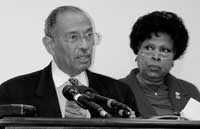
WASHINGTON (FinalCall.com)–When the final votes were tallied in the House of Representatives on a resolution expressing support and appreciation for both the President and members of the armed forces for the U.S.-led invasion of Iraq, members of the Congressional Black Caucus (CBC) were once again the leaders of the loyal opposition.
Many Democrats in the House found themselves in a bind, struggling to find a way to join Republicans in commending U.S. troops without endorsing President Bush and a way that the majority of them opposed last fall.
Eight of the 11 no votes were cast by CBC members, and 15 of the 22 abstentions were also Black members of Congress. Led by Rep. Sheila Jackson-Lee (D-Texas) some called their position a “Third Option.” Only 16 of the CBC’s 39 members voted in favor of the measure.
The “Third Option” proposal called for the convening of an international war crimes tribunal in order to indict Iraqi President Saddam Hussein; the convening of coalition troops on the Iraqi border to enforce vigorous United Nations inspections; humanitarian aid to the Iraqi people; a new emphasis on the Middle East peace process with a corresponding demonstration to the world that the U.S. is “balanced toward our concern for peace” in that region; and an active role for the UN in the rebuilding of Iraq.
The “Third Option” would require positioning only 50,000 U.S. troops, rather than the 250,000 already engaged in the military attack, Ms. Jackson-Lee explained.
“This is a very somber time for the nation,” Rep. Jackson-Lee told reporters March 20. The previous day, almost at the hour the President informed key congressional leaders that the U.S. attack was underway, Ms. Jackson-Lee and others took to the House Floor in order to “reaffirm the democratic principles by which we live. That is, even in the face of war, voices for peace and reconciliation can be raised.
“We in America have to be concerned with our place in today’s time, but (also) in history. Over the years, we have never accepted a position of a unilateral, preemptive strike–regime change–because we have always been viewed in the world as a defender as opposed to an offender,” said Ms. Jackson-Lee, who abstained from opposing or supporting the resolution outright, by voting “present.”
“No” votes were cast by Reps. John Conyers (D-Mich.), the Dean of the CBC; Charles Rangel (D-N.Y.); Stephanie Tubbs-Jones (D-Ohio); Barbara Lee (D-Calif.); Bobby Scott (D-Va.); Edolphus Towns (D-N.Y.); Maxine Waters (D-Calif.); and Diane Watson (D-Calif.), all members of the CBC. Reps. Jim McDermott (D-Wash.), Michael Honda (D-Calif.) and Fortney Stark (D-Calif.) also voted no.
“I deeply appreciate Congresswoman Sheila Jackson-Lee pointing out that Saddam Hussein should be tried for his crimes against humanity in the War Court in the Hague, exactly as Slobodan Milosevic was,” Rep. Conyers told reporters.
“I think this would be setting the example of leadership, of keeping the peace, and sparing the lives of maybe millions of people, mostly civilians,” he continued, calling for selective UN strikes to remove any weapons of mass destruction that may be hidden in Iraq. “That to me would be a lot different from the massive bombing, where many non-combatants will be assassinated.”
The debate must continue, Congressional war opponents maintain, while confessing that the President’s unilateral decision to start the war will intimidate some people who don’t want to be labeled “unpatriotic.” People in this country must distinguish between support for the safety of U.S. troops and subscribing to Mr. Bush’s war policies, they insist.
“While I support the troops, I cannot support this mission,” Rep. Dennis Kucinich (D-Ohio) said. “The administration has launched an unprovoked attack against another country. Iraq does not pose an imminent threat to the United States or any of the neighboring nations.”
The Bush administration has assumed a “radical and extreme” policy that is “aggressive” and “ideological,” and it may set a precedent for other belligerent states to adopt a similar preemptive, first strike policy, warned Mr. Kucinich, who is a candidate for the Democratic presidential nomination. He voted “present.”
Without a single shot being fired, the Berlin Wall fell, the Soviet Union disintegrated and the U.S. was able to maintain its position atop the high moral ground. “We stand here today to insist that the dialogue be continued and to insist that the United States Congress be a part of the dialogue,” said Rep. Jackson-Lee.
There was an unexpected interruption of the press conference calling for the Third Option. First-term Rep. Jim Marshall (D-Ga.) strode in toward the end of the event and was accorded the courtesy of being allowed to speak. He infuriated his colleagues, though when he declared that “the time for debate has passed,” and called on all members of Congress to now support the war.
“There’s an absolute right to debate. My preference is that we do not,” Mr. Marshall said. “I frankly think we should be quiet for a while.”
His comments were not, however, intended to stifle dissent among private citizens who are opposed to the war, he told reporters outside, in response to a question from The Final Call. “It would be fine with me if those folks chose to refrain from that behavior. I certainly would not engage in that behavior. I don’t deny they have a right. I simply disagree with the exercise of the right in this instance,” Mr. Marshall said.
Rep. John Lewis (D-Ga.) and Ms. Jackson-Lee were furious at Mr. Marshall’s violation of Congressional protocol. “He should have called his own press conference,” rather than intruding into the event called by Members with whom he did not agree, said Ms. Jackson-Lee.












